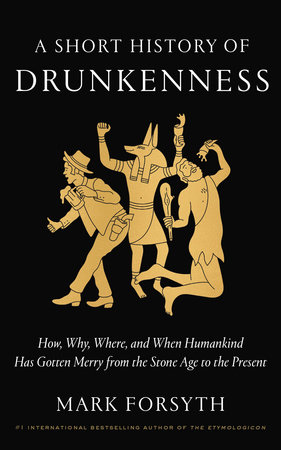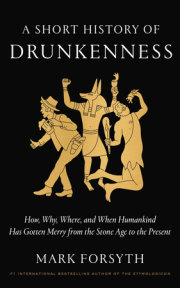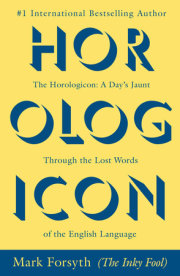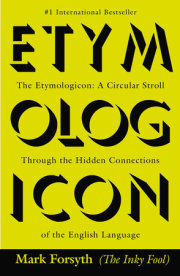***This excerpt is from an advance uncorrected copy proof*** Copyright © 2018 Mark Forsyth
I’m afraid that I don’t really know what drunkenness is.
That may seem an odd confession for a fellow who’s about to write a history of drunkenness, but, to be honest, if authors were to let a trifling thing like ignorance stop them from writing, the bookshops would be empty. Any- way, I do have some idea. I have been conducting extensive empirical investigations on drunkenness ever since the tender age of fourteen. In many ways, I like to think of myself as being a sort of latter-day St. Augustine who asked, “What then is time? If no one asks me, I know what it is. If I wish to explain it to him who asks, I do not know.” Substitute the word drunkenness for time and you pretty much have my saintly position.
I’m aware of some basic medical facts. A couple of gin and tonics will impair your reflexes; a dozen or so will reacquaint you with your lunch and make it difficult to stand up, and an uncertain number, which I am unwilling to investigate, will kill you. But that’s not what we know (in an Augustinian way) drunkenness is. Certainly, if an alien knocked on my door and asked why people across this peculiar planet keep drinking alcohol, I wouldn’t answer, “Oh, that’s just to impair our reflexes. It’s basically to stop us getting too good at Ping-Pong.”
There’s another canard which is usually trotted out at this point, that alcohol lowers your inhibitions. Nothing could be further from the truth. I do all sorts of things when I’m squiffy that I never wanted to do when sober. I can talk for hours to people that, sober, I would consider tedious. I recall once leaning out of the window of a flat in Camden Town waving a crucifix about and telling passersby to repent. This isn’t something that I long to do when sober but just don’t have the nerve for.
Anyway, some of alcohol’s effects are not caused by alcohol. It’s terribly easy to hand out nonalcoholic beer without telling people that it contains no alcohol. You then watch them drink and take notes. Sociologists do this all the time, and the results are consistent and conclusive. First, you can’t trust a sociologist at the bar; they must be watched like hawks. Second, if you come from a culture where alcohol is meant to make you aggressive, you get aggressive. If you come from a culture where it’s meant to make you religious, you become religious. You can even change this from drinking session to drinking session. If the devious sociologist announces that they’re investigating liquor and libido, everyone gets libidinous; if they say it’s about song, everyone suddenly bursts out singing.
People even alter their behavior depending on what species of booze they think they’re imbibing. Even though the active ingredient—ethanol—is identical, people will alter their behavior depending on the origins and cultural associations of the tipple in question. English people are very likely to get aggressive after a few pints of lager, but give them wine—which is associated with poshness and France—and they will become demure, urbane and, in serious cases, sprout a beret. There’s a reason we have lager- louts but not vermouth-vandals or Campari-contrarians.
Some people get very angry when you tell them this. They insist that alcohol causes whatever it is that they don’t like—let’s say violence. If you point out that cultures where alcohol is banned are still violent, they harrumph. If I point out, which I can, that I drink an awful lot more than most, but that I haven’t hit anyone since the age of about eight (before intoxicating liquors had ever touched my pacific lips), they say, “Well, yes, but what about other people?” It’s always other people, damn them—other people are hell. But most people are able to drink all evening at a nice dinner party without once stabbing the guest on their right.
And, in the unlikely event that you were suddenly transported to another time and place, an Ancient Egyptian would probably be very surprised that you weren’t drinking to receive a vision of the lion-headed goddess Hathor—I thought everyone did that. And a Neolithic shaman would wonder why you weren’t communicating with the ancestors. A Suri of Ethiopia would probably ask why you hadn’t started work yet. That’s what Suri people do when they drink; as the saying goes, “Where there is no beer, there is no work.” Just as an incidental technical point, this is called transitional drinking: drinking to mark the transition from one bit of the day to the other. In England we drink because we’ve finished working, the Suri drink because they’ve started.
To put this all another way, when Margaret Thatcher died she was not buried with all her wineglasses and a corner-shop’s worth of booze. We think this normal. In fact, we’d think it odd if she had been. But we are the odd ones, we’re the weirdos, we’re the eccentrics. For most of known human history political leaders have been buried with all things needful for a good postmortem piss-up. That goes all the way back to King Midas, to Proto- Dynastic Egypt, to the shamans of Ancient China and, of bloody course, to the Vikings. Even those who have long stopped breathing like to get trolleyed now and then— just ask the Tiriki tribe of Kenya, who go and pour beer onto their ancestors’ graves just in case.
Drunkenness is near universal. Almost every culture in the world has booze. The only ones that weren’t too keen—North America and Australia—have been colonized by those who were. And at every time and in every place, drunkenness is a different thing. It’s a celebration, a ritual, an excuse to hit people, a way of making decisions or ratifying contracts, and a thousand other peculiar practices. When the Ancient Persians had a big political decision to make they would debate the matter twice: once drunk, and once sober. If they came to the same conclusion both times, they acted.
That is what this book is about. It’s not about alcohol per se, it’s about drunkenness: its pitfalls and its gods. From Ninkasi, the Sumerian goddess of beer, to the 400 drunken rabbits of Mexico.
A couple of points should be made before we set off. First, this is a short history. A complete history of drunkenness would be a complete history of humanity and require much too much paper. Instead, I have decided to pick certain points in history to see how people went about getting sozzled. What was it actually like in a Wild West saloon, or a medieval English alehouse, or a Greek symposium? When an Ancient Egyptian girl wanted to go out on the lash what exactly did she do? Of course, each evening is different, but it’s possible to get a good, if hazy, notion.
History books like to tell us that so-and-so was drunk, but they don’t explain the minutiae of drinking. Where was it done? With whom? At what time of day? Drinking has always been surrounded by rules, but they rarely get written down. In present-day Britain, for example, though there is no law in place, absolutely everybody knows that you must not drink before noon, except, for some reason, in airports and at cricket matches.
But in the middle of the rules is unruly drunkenness. The anarchist at the cocktail party. She (I think it’s a she, deities of drink usually are) is the one I want to watch. Ideally, I’d like to arrest her and take her mugshot, but I’m not sure it’s possible. At least then, when that curious alien asked me what drunkenness was, I would have something to show.
Copyright © 2018 by Mark Forsyth. All rights reserved. No part of this excerpt may be reproduced or reprinted without permission in writing from the publisher.









